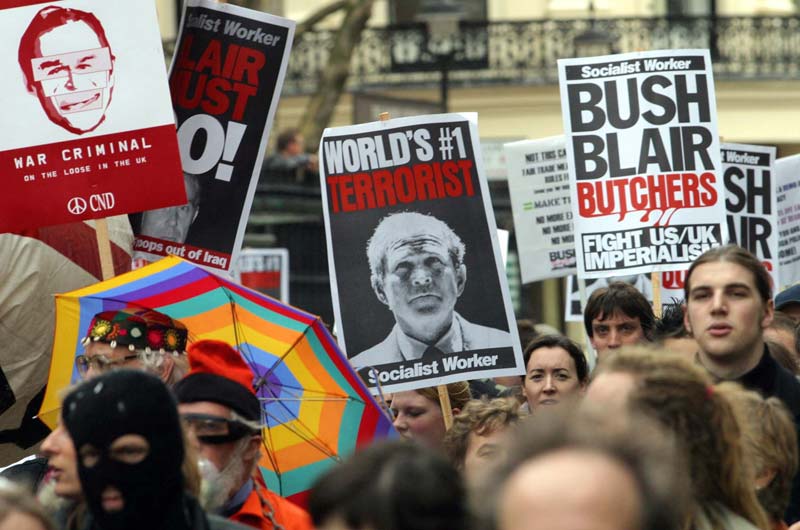 Graham Barclay for Bloomberg
Graham Barclay for Bloomberg
Trump, who is deeply unpopular in Britain, has offended, outraged and antagonized Britons on numerous occasions since being elected. Almost 60,000 people are expected to march to London's Trafalgar Square on Friday to protest his visit in what organizers on Facebook are calling a "carnival of resistance." Earlier this year, more than 1.8 million people signed a petition to stop Trump from making a state visit to the United Kingdom.
"The British still have a sense of what they consider to be suitable behavior. They see Trump as someone who, given his elevated station, falls short of those standards," said historian Stephen Brumwell.
While Trump may be the first to inspire the flying of an inflatable orange baby over London, he is not the first U.S. president to trigger protests on British soil. Numerous presidents have prompted controversy in the past - largely because of their personalities and policies. And Brits have never shied away from expressing their feelings during presidential visits, often through very public displays.
In November 2003, President George W. Bush and first lady Laura Bush embarked on a three-day state visit to Britain, just months after Iraqi dictator Saddam Hussein was overthrown. Bush's visit included a banquet with the queen, a joint news conference with Prime Minister Tony Blair and a tour of Westminster Abbey - much to the dismay of many Brits.
While Blair vowed to "stand firm" with America, thousands of anti-Iraq War protesters gathered across Britain to protest Bush's policies and presence. Police placed the number of attendees at around 100,000 people. Some wore T-shirts with the words "It's about the oil, George" across the front, while others thrust placards into the air that read "Stop the war." Many other signs referred to Bush as the "world's number one terrorist." One banner, in true British fashion, politely declared: "This is a jolly bad show."
And a jolly bad show it was.
According to the BBC, an egg was launched at the presidential motorcade and a total of 67 arrests were made (including that of the egg-thrower). Meanwhile, in Trafalgar Square, crowds gathered as an effigy of Bush was toppled. Protests against Bush also were held in the northern city of Manchester and County Durham, where the president visited a village pub.
Reflecting on the mood of the nation and attitudes toward Blair and Bush at the time, Brumwell said, "There was a lot of anger. People felt that they may have voted for the politician, but they didn't vote for the war."
In the summer of 1982, President Ronald Reagan's first visit to Britain started out in perhaps the worst possible way. According to the Telegraph, the president ignored the queen's invitation to stay at Windsor Castle. Two months passed without an official response from Reagan, risking creating the "worst possible impression," according Nicholas Henderson, the British ambassador to Washington at the time.
Not every president's visit has come with controversy, however. The Obamas literally got the red-carpet treatment at 10 Downing Street during their 2011 visit, and crowds lined the streets outside Buckingham Palace hoping to catch a glimpse of the couple as they were driven inside to meet the Queen.
"To the British public, Obama represented a forward-looking, multicultural attitude," Brumwell said.
But nothing may compare with the welcome President John F. Kennedy and first lady Jackie Kennedy received when they landed in London, where they were greeted by a cheering crowd. Although the visit was brief, the couple attended a dinner at Buckingham Palace with the queen and Prince Philip, Duke of Edinburgh. Footage from the time shows the crowd surging toward the palace gates as the presidential motorcade pulled in. On the streets outside the palace, throngs cheered and a marching band played.
Although he never visited Britain, George Washington was voted as "Britain's greatest foe" in a poll by London's National Army Museum in 2012. Washington was viewed as a greater enemy than France's Napoleon Bonaparte and Turkey's Mustafa Kemal Ataturk, according to the poll.
Brumwell described the "greatest foe" title as more of an honor than an insult.
"[Washington] had qualities the British admired, even though he was an enemy. People admired his dignity and decorum," Brumwell said.
"He was an honorable opponent. He was a statesman, and he was a soldier," he added. "Many see Trump as the antithesis. He behaves in a way that no other U.S. president has."


 Contact The Editor
Contact The Editor
 Articles By This Author
Articles By This Author